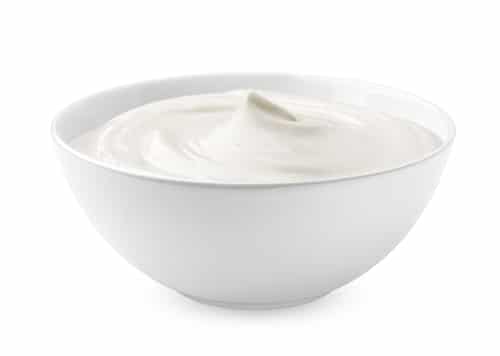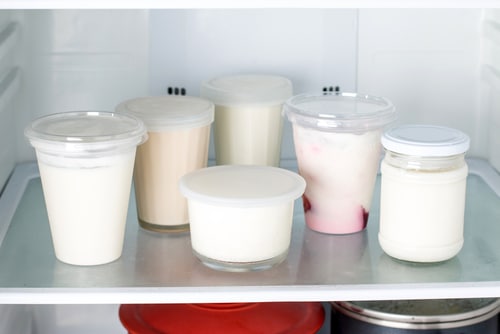First things first: Can you freeze sour cream? The answer is a resounding “Yes,” although there are some naysayers who don’t care for the changed texture of the cream.
Let’s jump into how to freeze sour cream properly and how to address any concerns about its texture.
Can You Freeze Sour Cream?
Yes, you can freeze sour cream for up to 6 months. That’s great news for anyone who has bought sour cream with the best of intentions, yet ended up having to throw it out because it went bad in the refrigerator.
Fortunately, if you take the proper precautions and follow appropriate steps, you can safely freeze and thaw sour cream. It’s important to note that the sour cream’s texture will change since the moisture separates as the sour cream freezes.
Once you take the sour cream out of the freezer and it begins to thaw, its texture and consistency may look somewhat like cottage cheese. Although it will still taste the same, its texture won’t be appealing as a dip or topping on foods like baked potatoes or tacos.
Therefore, be sure to use your thawed sour cream in cooked or baked foods only. After you thaw frozen sour cream, you can use it to add a nice creaminess to casseroles, soups, and some baked goods.
Related: Can you freeze cream cheese?
How To Freeze Sour Cream

In addition to freezing sour cream to keep it from going to waste, you can always buy a few extra containers when they’re on sale and keep them in your freezer for later.
If your sour cream is three weeks past its sell-by date, whether opened or unopened, do not put it in your freezer. Instead, throw it away immediately, because it’s already a lost cause.
After ensuring that your sour cream is still fresh, spoon the sour cream into a bowl, and whip it with a spatula or whisk, ensuring that the moisture is distributed equally.
Can I Freeze Sour Cream in Its Original Container?
Some do choose to store the sour cream in its original container. That’s fine if you ensure that the lid is closed tightly. However, you may decide to divide your sour cream into smaller air-tight bowls that keep out moisture or use several plastic zipper freezer bags. If using freezer bags, squeeze out any extra air and ensure they’re completely sealed. This way, you can easily take out and thaw smaller portions.
Some find that another easy way to freeze sour cream is to pour it into an ice cube tray. For longer storage, once the sour cream is frozen, you can move the cubes to a freezer bag. You can then easily grab one or two cubes and add them to your dish.
It’s a Date
This next step is an important one that many forget to take before they put their sour cream into the freezer. Using a permanent marker, write the date you stored the sour cream in the freezer on the zipper bags or on waterproof labels that you can stick on the containers.
Or if you’re using an ice cube tray, write down the expiration date on a piece of paper or Post-It® note. Then place it where you’ll remember to periodically check it, such as on your refrigerator.
After you’ve frozen your sour cream, you can remove the containers or freezer bags any time you’d like to use sour cream for the next few months. But do keep in mind that sour cream will continue to deteriorate with time even while it’s still frozen. Therefore, plan to thaw the sour cream and use it relatively soon.
How Do I Thaw Frozen Sour Cream?
When you’re ready to thaw your sour cream, place it in your fridge for a few hours until it’s thawed. A helpful tip: When you put your sour cream in the fridge to thaw, separate it from fruits, onions, and garlic to prevent it from absorbing potent odor.
Depending on the size of the portions that you’ve frozen, thawing may take from two to eight hours. Consider whipping in a teaspoon of cornstarch to help restore some of the sour cream’s original creaminess.
Can Sour Cream Be Frozen and Used Without Being Thawed?
Yes, rather than thawing sour cream in the refrigerator, you can place the amount you’ll be using in a microwave-safe container. Heat the sour cream in intervals for no longer than 25 to 30 seconds until it has fully melted. Be extremely careful not to overheat your sour cream by heating it for longer intervals, since doing so could be unsafe and negatively impact the sour cream’s taste and texture.
In addition, depending upon your recipe, you may even consider adding the frozen sour cream directly to the pot, such as in stews or soups.
An Important Rule of Thumb
Never be tempted to put sour cream back into the freezer after you’ve thawed it. Doing so could encourage the growth of bacteria.
How Long Will Sour Cream Last in the Fridge / Freezer?

Generally, once you open a container of sour cream and refrigerate it, you can expect that it will stay fresh for about two weeks after the “best if used by” date. This date indicates when the sour cream has the highest quality and best flavor and texture. You should buy sour cream before the “sell by” date.
Importantly, note that the “use by” date indicates the last date that you should consume the sour cream. If you inadvertently leave sour cream out on your kitchen counter, and it remains there for several hours at room temperature, bacteria can smolder regardless of its “best if used by date.” The U.S. Department of Agriculture (USDA) and the Food and Drug Administration (FDA) recommend that all consumers pay attention to and follow the “use by” date.
Of course, it’s important to use your common sense, so that you can properly judge your sour cream’s freshness. Always follow proper food storage recommendations. Further, remember there are no guarantees that your sour cream is safe for consumption before the “use by” date.
The good news is that sour cream can be kept in the freezer for up to six months. However, as noted above, even if sour cream is frozen, it does begin to deteriorate over time. Regularly check the labels to confirm the day that you put the sour cream into the freezer. Once it’s getting close to that date, be sure to dispose of the sour cream.
How To Tell If Your Frozen Sour Cream is Bad
In addition to using common sense, use your senses of smell, taste, and sight. Always inspect the sour cream’s appearance to ensure that it isn’t off-color and hasn’t developed mold. You should also smell it to determine whether it gives off an unfamiliar, unpleasant odor stronger than the normal sour aroma, suggesting spoilage. Also take a small taste to ensure that it doesn’t have a sharp, bitter, or unusual taste.
Don’t be alarmed if the liquid appears to have separated a bit from the cream. You can simply mix the liquid and solid cream back together with a clean spoon or drain off the liquid.
However, do be wary when the liquid has not only separated but has begun to pool with unusually high amounts of liquid floating on the surface. This means that your sour cream may be starting to go bad, so use it in a day or so.
You can tell that your sour cream has gone bad if the liquid appears discolored, and it has pockets of watery liquid, dark green or black mold on the surface, and/or pink, blue, or yellow spots indicating bacterial spoilage. You may also see mold inside the container’s lid. If you note any of these signs of spoilage, it’s time to send your sour cream down the garbage disposal, wash out the container, and put the clean container in your recycling bin. Be sure to wash your hands thoroughly.
Can Bad Sour Cream Make You Sick?
If you consume sour cream that has gone bad, you may be at risk for mild or severe food poisoning a few hours after eating the bad sour cream. If you experience food poisoning, you may develop nausea, diarrhea, stomach pain, and fever.
What To Do with Frozen Sour Cream?
Countless recipes include thawed sour cream to add a delicious creaminess to a meal. These include muffins, pancakes, casseroles, soups, slow cooker stews, Dutch Oven recipes, pies (except for the toppings), and more.
Per allrecipes.com, extremely popular sour cream recipes include banana oat muffins, blueberry cream coffee cake, twice-baked cheesy potato casserole, and chicken enchiladas. Be sure to do a Google or Bing search to find delicious recipes where you can use frozen or thawed sour cream.
So the next time someone asks “Can you freeze sour cream?,” not only will you be able to share tips for doing so successfully, you’ll also have some tasty new recipe suggestions for them.
More on freezing:







